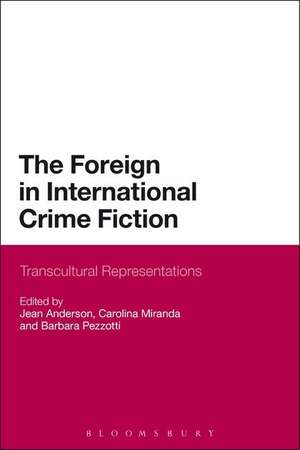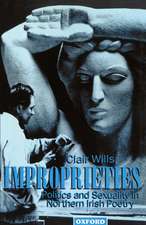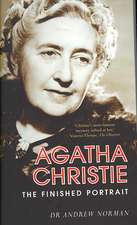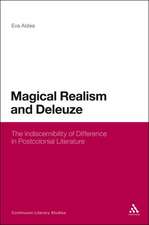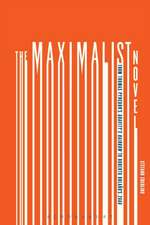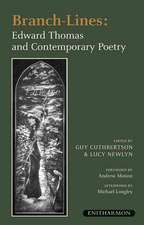The Foreign in International Crime Fiction: Transcultural Representations
Editat de Professor Jean Anderson, Dr Carolina Miranda, Dr Barbara Pezzottien Limba Engleză Paperback – 23 apr 2014
| Toate formatele și edițiile | Preț | Express |
|---|---|---|
| Paperback (1) | 257.32 lei 43-57 zile | |
| Bloomsbury Publishing – 23 apr 2014 | 257.32 lei 43-57 zile | |
| Hardback (1) | 773.88 lei 43-57 zile | |
| Bloomsbury Publishing – 13 iun 2012 | 773.88 lei 43-57 zile |
Preț: 257.32 lei
Preț vechi: 295.29 lei
-13% Nou
Puncte Express: 386
Preț estimativ în valută:
49.24€ • 51.54$ • 40.98£
49.24€ • 51.54$ • 40.98£
Carte tipărită la comandă
Livrare economică 31 martie-14 aprilie
Preluare comenzi: 021 569.72.76
Specificații
ISBN-13: 9781472569547
ISBN-10: 1472569547
Pagini: 256
Dimensiuni: 156 x 234 x 13 mm
Greutate: 0.35 kg
Editura: Bloomsbury Publishing
Colecția Bloomsbury Academic
Locul publicării:London, United Kingdom
ISBN-10: 1472569547
Pagini: 256
Dimensiuni: 156 x 234 x 13 mm
Greutate: 0.35 kg
Editura: Bloomsbury Publishing
Colecția Bloomsbury Academic
Locul publicării:London, United Kingdom
Caracteristici
Examines how international crime fiction presents issues of 'otherness', globalization, immigration and diaspora communities.
Notă biografică
Jean Anderson is Associate Professor at Victoria University of Wellington, New Zealand and Director of the New Zealand Centre for Literary Translation. She is the Editor of The New Zealand Journal of French Studies. Carolina Miranda is Lecturer at Victoria University of Wellington, New Zealand.Barbara Pezzotti is a journalist and Teaching Fellow in Italian at Victoria University of Wellington, New Zealand.
Cuprins
ContributorsIntroductionPart 1: Inside Out or Outside In? The Scene of the Crime as Exotic DécorChapter 1: Cannibalistic Maori Behead Rupert Murdoch: (Mis)representations of Antipodean Othernessin Caryl Férey's 'Maori Thrillers Ellen Carter and Deborah WalkerChapter 2: 'A desk is a dangerous place from which to watch the world': Britishness and Foreignness in le Carré's Karla Trilogy Sabine Vanacker Chapter 3: Havana Noir: Time, Place and the Appropriation of Cuba in Crime Fiction Philip SwansonChapter 4: Shanghai, Shanghai: Placing Qiu Xiaolong's Crime Fiction in the Landscape of GlobalizedLiterature Hui LuoChapter 5: Seeing Double: Representing Others in the Franco-Pacific Thriller Jean AndersonPart 2: Private Eyes, Hybrid Eyes: The In-Between DetectiveChapter 6: 'Don't Forget the Tejedor': Community and Identity in the Crime Fiction of Rosa Ribas Stewart KingChapter 7: An American in Paris or Opposites Attract: Dominique Sylvain's 'In-Between'Bicultural Detective Stories France Grenaudier-KlijnChapter 8: Arthur Upfield and Philip McLaren: Pioneering Partners in Australian Ethnographic Crime Fiction John and Marie RamslandChapter 9: From Wolf to Wolf-Man: Foreignness and Self-Alterity in Fred Vargas's L'Homme à l'envers Alistair RollsChapter 10: Others Knowing Others: Stieg Larsson's Millennium Trilogy and Peter Høeg's Smilla's Sense of Snow Andrew Nestingen and Paula Arvas Chapter 11: Smog, Tweed and Foreign Bedevilment: Bourland's Twenty-First-Century Remake of the Sherlock Holmes Crime Story Keren Chiaroni Part 3: When Evil Walks Abroad - Towards a Politics of Otherness Chapter 12: 'The Meanest Devil of the Pit': British Representations of the German Character in Edwardian Juvenile Spy Fiction, 1900-1914 Andrew FrancisChapter 13. Reading Others: Foreigners and the Foreign in Roberto Arlt's Detective Fiction CarolinaMirandaChapter 14: Who is the Foreigner? The Representation of the Migrant in Contemporary Italian Crime Fiction Barbara PezzottiChapter 15: Images of Turks in Recent German Crime Fiction: A Comparative Study in Xenophobia Margaret SutherlandChapter 16. The Representation of Chinese Characters in Leonardo Padura's La cola de la serpiente (2000): Sinophobia or Sinophilia? Carlos UxóBibliographyIndex
Recenzii
Ranging from early twentieth-century British spy stories to contemporary Scandinavian thrillers and covering settings that include Argentina, the French Pacific, Cuba, Australia, New Zealand, and much of Europe, the sixteen essays in this important collection ask crucial questions about the ways in which the encounter with the foreign has been staged in Western literature... The Foreign in International Crime Fiction is indispensable reading not only for scholars of the genre but also of ethnography, and of post-colonial and travel literature.
This volume presents an array of original perspectives on the representation of the Other and the production of cultural hybridity in international crime writing. A must read for anybody interested in contemporary crime fiction on a global scale.
It is a must read for those who want to widen their crime fiction horizons. They should not be disappointed.
This volume presents an array of original perspectives on the representation of the Other and the production of cultural hybridity in international crime writing. A must read for anybody interested in contemporary crime fiction on a global scale.
It is a must read for those who want to widen their crime fiction horizons. They should not be disappointed.
